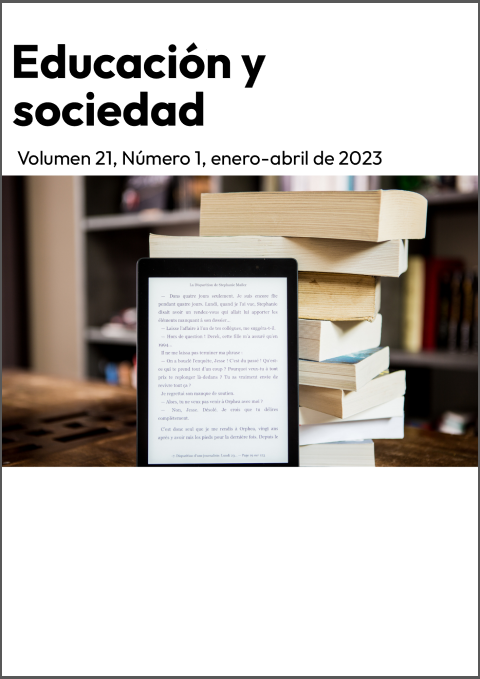Visibilization of the Mapuche people in Santiago: A didactic proposal linked to the kimün and orality
Keywords:
claim, community, culture, didactic proposal, identity, memoryAbstract
This research article aims to create a didactic proposal, linked to the participation of the Mapuche people in the historical processes in the Chilean territory, throughout the 20th century. For this purpose, a research with a qualitative approach was carried out, in the form of a bibliographic review, creating a didactic proposal based on the nuclearization of the corresponding units of the subjects of History, Geography and Social Sciences and Language and Culture of Ancestral Peoples. The didactic proposal was organized in seven classes, with a common objective. It intertwines methodologies of the traditional educational system with the orality of ancestral knowledge, through experiences made visible in the stories. Focusing on the Mapuche community living in the city of Santiago, as a result of migration, due to violent exile, seeking to create a sense of belonging to the ethnic group, making it part of the daily life of people, both their language, worldview and knowledge.
References
Alvarado, M. & Alvarado, M. (2012). De reforma y exterminio. Apuntes sobre identidad mapuche, aculturación y educación mapuche. Diálogos Educativos, 23(12), 134-147.
Antileo, E. (2014). Lecturas en torno a la migración mapuche. Apuntes para la discusión sobre la diáspora, la nación y el colonialismo. El poder de la cultura. Espacios y discursos en América Latina, (1), 261-287.
Austin, T. R. (2000). Para comprender el concepto de cultura. Revista UNAP Educación y Desarrollo, 1(1), 1- 18.
Calderón, M., Castillo, S., Fuenzalida, D., Hasler, F., Mariano, H., & Vargas, C. (2017). Estudio de casos de la enseñanza de la lengua y cultura mapuche y su implementación como asignatura del currículo de educación básica. Calidad en la Educación, (47), 43-80.
Canales, P. & Urrutia, M. (2022). La gente de la tierra sin tierra: migración, leyes chilenas y tensiones reduccionales en el siglo XX. REVISTA CUHSO, 32(1), 514–534. doi:10.7770/cuhso-v32n1-art2406.
Dietz, G. (2017). Interculturalidad: una aproximación antropológica. Perfiles Educativos, 39(156), 192-207.
División de Educación General. (2017). Programa de educación intercultural bilingüe 2010- 2016. Ministerio de Educación.
León, L. (2007). Ngulan mapu (Araucanía): La pacificación y su relato historiográfico, 1900-1973. Revista de Historia Social y de las Mentalidades, 2(11), 137-170.
Mansilla, J. G., Beltrán, J. C. y Véliz, A. (2022). Tensiones entre el saber mapuche (mapun kimün) y el saber escolar chileno. Revista de Ciencias Humanas, Teoría Social y Pensamiento Crítico, (16), 188-196.
Marcús, J. (2011). Apuntes sobre el concepto identidad. Intersticios. Revista Sociológica de Pensamiento Crítico, 5(1), 107-114.
Muñoz, A. (1995). La educación intercultural, hoy. Didáctica (lengua y literatura), 7, 217-240.
Navarrete, Z. (2015). ¿Otra vez la identidad?: Un concepto necesario pero imposible. Revista mexicana de investigación educativa, 20(65), 461-479.
Pollak, M. (2006). Memoria, olvido, silencio. La producción social de identidades frente a situaciones límite. Ediciones Al Margen.
Seydel, U. (2014). La constitución de la memoria cultural. Acta Poética, 35(2), 187-214.
Toledo, M. I. (2012). Sobre la construcción identitaria. Atenea, 506, 43-56.
Unidad de Currículum y Evaluación. (2018). Bases Curriculares Primero a Sexto Básico. Ministerio de Educación, República de Chile.
Unidad de Currículum y Evaluación. (2021). Bases Curriculares Lengua y Cultura de los Pueblos Originarios Ancestrales Primero a Sexto año de Educación Básica.
Vigilia, N. (2002). El concepto de interculturalidad. Editorial Magisterio.
Walsh, C. (2010). Interculturalidad crítica y educación intercultural. Construyendo interculturalidad crítica, 75(96), 167-181.
Downloads
Published
How to Cite
Issue
Section
License
Copyright (c) 2023 Educación y sociedad

This work is licensed under a Creative Commons Attribution-NonCommercial-ShareAlike 4.0 International License.
Los autores ceden su derecho de autor a Educación y Sociedad y otorgan a todos los usuarios potenciales, de manera irrevocable y por un período de tiempo ilimitado, el derecho de utilizar, copiar, transformar y distribuir el contenido. La cesión de derecho de autor incluye también:
- Traducir, adaptar, reutilizar, resumir el trabajo y ejercer todos sus derechos sobre dichas adaptaciones, resúmenes, extractos y obras derivadas.
- Incluir el trabajo y su versión traducida, adaptada o resumida, total o parcialmente, en bases de datos informatizadas, selección o recopilación de textos digitales o impresos a disposición de terceros.
Cada autor asume que en caso de que el artículo fuese aprobado para su publicación en la revista Educación y Sociedad:
- Cede sus derechos patrimoniales y autoriza al comité editorial para la publicación del documento con el correo electrónico y la afiliación institucional de los autores.
- Autoriza la divulgación en la página web de la revista, en repositorios y directorios en se incluye o pueda incluirse en el futuro.
- Certifica que ha contribuido directamente al contenido intelectual de este manuscrito.
- Se responsabiliza públicamente con su contenido y acepta que su nombre figure en la lista de autores.
- Garantiza que el artículo es un documento original y no ha sido publicado total ni parcialmente, en ningún otro lugar.
- No ha incurrido en fraude científico, plagio o vicios de autoría; en caso contrario se exime de toda responsabilidad a la revista Educación y Sociedad y se declara responsable.
- Se compromete a no presentar este artículo a otra revista para su publicación, hasta recibir la decisión de la editorial de la publicación sobre el concepto final.











